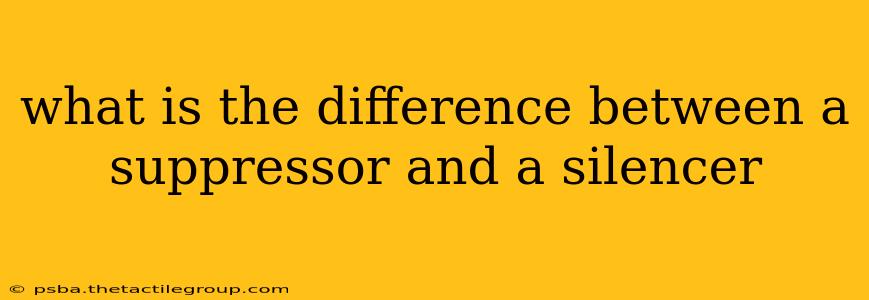The terms "suppressor" and "silencer" are often used interchangeably, leading to confusion. While they both refer to firearm attachments designed to reduce the sound of gunfire, there's a crucial distinction: it's a matter of semantics and legal terminology. This article will clarify the difference and delve into the technology behind these devices.
The Semantics: Suppressor vs. Silencer
The key difference lies in the accuracy of the description. Silencer is a misnomer. These devices don't silence a firearm completely; they significantly suppress the sound. The term "silencer" creates a false impression of absolute quiet, leading to unrealistic expectations.
Therefore, suppressor is the more accurate and preferred term. It accurately reflects the device's function: reducing, not eliminating, the sound of a gunshot. This terminology is also widely used in legal and regulatory contexts.
How Suppressors Work: The Science of Sound Reduction
Suppressors work by utilizing a series of baffles within a cylindrical tube. These baffles redirect and expand the expanding gases produced when a firearm is discharged. This expansion process reduces the velocity and pressure of the gases, resulting in a quieter report.
Here's a breakdown of the process:
1. Gas Expansion and Divergence:
When a bullet exits the barrel, high-pressure gases are expelled. The suppressor's baffles force these gases to expand into a larger volume, thus reducing their pressure.
2. Sound Wave Absorption:
The baffles are often designed with features to absorb some of the sound energy produced by the expanding gases. This further contributes to sound reduction.
3. Reducing Muzzle Blast:
A significant component of a gunshot's loudness is the muzzle blast – the sudden expulsion of hot gases from the firearm's barrel. Suppressors effectively mitigate this blast by managing the expansion and redirection of these gases.
The Result: A Quieter, More Manageable Shot
While suppressors don't render firearms silent, they substantially reduce the sound level. The actual reduction depends on several factors, including the caliber of the firearm, the suppressor's design, and the type of ammunition used. The sound reduction can range from a noticeable decrease to a significant dampening, making the gunshot sound more like a thud than a sharp bang.
Legal Considerations: Regulations and Restrictions
The legality of owning and using suppressors varies significantly depending on location. Many jurisdictions have strict regulations governing their purchase, registration, and use. It's crucial to understand and comply with all applicable local, state, and federal laws before considering acquiring a suppressor. Failure to do so can result in serious legal consequences.
Conclusion: Understanding the Terminology and Technology
The difference between "suppressor" and "silencer" boils down to accuracy. "Suppressor" is the correct and preferred term, accurately reflecting the device's function. Understanding how suppressors work, their limitations, and the legal aspects surrounding them is crucial for anyone considering their use. Always prioritize safety and legal compliance.

